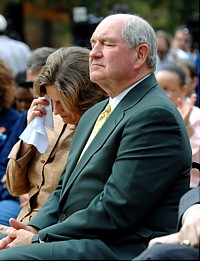DEC.
30, 2007 ![]() THIS
IS OLDSMOBILITY
THIS
IS OLDSMOBILITY
In a letter elsewhere on this website, I recalled attending a July 20, 1974, performance by a star of an ABC series that was just concluding its five-year run, The Brady Bunch. I wrote:
Now I've discovered the existence of a fifty-year-old original-cast recording of one of those Oldsmobile musicals starring Florence Henderson!
This Is Oldsmobility would have been produced in August of 1957, three years before the show and luncheon that I described attending in Detroit. Back then, there was a major styling change every model year, and the new designs were a closely guarded secret until the official heavily-promoted public Announcement date in September. These August shows gave the dealers and salesmen their first look at the cars that they would be expected to sell for the following twelve months.
 At
the climax of each big musical number, the cast would step aside and
the scenery would part to reveal a brand-new model, such as this 1958
Ninety-Eight four-door sport sedan. To oohs and aahs and gasps
and applause, the car would move downstage on a turntable. An
off-stage announcer described its virtues while it slowly rotated,
sparkling in the theatrical lighting, and the orchestra played an
upbeat background.
At
the climax of each big musical number, the cast would step aside and
the scenery would part to reveal a brand-new model, such as this 1958
Ninety-Eight four-door sport sedan. To oohs and aahs and gasps
and applause, the car would move downstage on a turntable. An
off-stage announcer described its virtues while it slowly rotated,
sparkling in the theatrical lighting, and the orchestra played an
upbeat background.
I'd forgotten that the young lovers in these musicals were always called Johnny and Lucille, from the car company's 1905 theme song. “Young Johnny Steele has an Oldsmobile; he loves a dear little girl. . . . Come away with me, Lucille, in my merry Oldsmobile . . . .” The 1957 show's Broadway inspirations apparently included Ethel Merman (“I Need a Guy”) and The Music Man (“Back to Rockport, Indiana”).
Just to prove I'm not kidding about all this, you can click here to listen.
DEC.
26, 2007 ![]() ELEMENTARY,
MY DEAR READERS
ELEMENTARY,
MY DEAR READERS
I've learned of a website that rates other web pages on the basis of readability. I assume that the algorithm calculates such metrics as average word length and average sentence length, on the principle that a reader can't comprehend big words and complicated sentences without a higher level of education.
Naturally, I was curious about my own "blog," so I typed in the address of this site's home page, the one you're reading now. The results were surprising, at least at first.
 I
certainly don't write with an audience of elementary school children
in mind. On the other hand, I do try to keep my writing easy to
understand. I want you to grasp what I'm saying right
away. I try to avoid long, confusing sentences. Evidently
I've succeeded.
I
certainly don't write with an audience of elementary school children
in mind. On the other hand, I do try to keep my writing easy to
understand. I want you to grasp what I'm saying right
away. I try to avoid long, confusing sentences. Evidently
I've succeeded.
But still, elementary school? I myself have a master's degree. I should be capable of more sophistication than that, shouldn't I?
So I typed in the address of this other article on my site. Written while I was still in high school, it intentionally aims at a more pretentious academic style. The algorithm calculated a reading level of COLLEGE (UNDERGRAD).
That's better. It doesn't quite rise to the level of requiring an actual college diploma to comprehend, but at least it's more respectable.
DEC.
20, 2007 ![]() THE
CHRISTMAS TAPES
THE
CHRISTMAS TAPES
On the day that I received a tape recorder as a present, December 25, 1961, I had to try it out on my family. Now you too can experience Christmas 1961.
|
|
Hear me play two songs on this Baldwin organ. Hear my father trying to come up with something to say into the microphone. (Eventually he tries to sing.) Hear my mother at the dinner table, absently-mindedly mixing dressings. And hear the only known recordings of my Grandmother Buckingham's voice. |
Yes, folks, it's a special holiday extravanganza right here at the T. Buckingham Thomas website. Merry Christmas to all!
DEC.
18, 2007 ![]() PORTABLE
RADIO
PORTABLE
RADIO
In a new article, I remember a transistor radio that came in a $4,000 carrying case called an Oldsmobile, and I let you listen to recordings I made off the air in 1961. Among them: a Richwood High School basketball game, broadcast by an announcer who's now in Oklahoma. It's all in Ed Paulin and the Radios.
DEC.
17, 2007 ![]() SHUFFLING
BACK FROM BUFFALO
SHUFFLING
BACK FROM BUFFALO
It's always interesting in Western New York this time of year. For the story of what I was doing there this past stormy weekend, and how I returned yesterday morning, click here.
DEC.
12, 2007 ![]() THE
INITIAL MAKES THE NAME
THE
INITIAL MAKES THE NAME
When we read, we skim over the material to get the sense, but we don't necessarily look carefully at every letter.
Last week, Pittsburgh Steelers safety Anthony Smith boldly "guaranteed" a victory over the undefeated New England Patriots. On Sunday, Tom Brady burned Smith on a couple of long passes, and the Patriots easily won. On Monday, Pittsburgh pundits roundly criticized Smith for his foolish boast.
Then on Tuesday, there was more bad news for the Steelers defense: During that Patriots game, Aaron Smith tore a biceps muscle. He'll be out for the season. "Does this count as irony," I wondered, "or just bad karma? Either way, this has not been a good week for him." But as I read further, I found no mention of the rash "guarantee" that had been so widely discussed only the day before. Finally I realized that the injured player was a different A. Smith, this one a defensive end.
The first letter is most important in recognizing a word, at least for me. If I'm not careful, Anthony and Aaron appear to be the same.
I remember a similar confusion when reading Albert Schweitzer's biography of Johann Sebastian Bach. In Leipzig, Germany, there were several Lutheran churches including St. Thomas's, St. Nicholas's, and St. Peter's. I couldn't keep them straight. "Where was that cantata performed? I don't know; St. Somebody's." It's much easier for me when the churches' German names are used: Thomaskirche, Nikolaikirche, and Petrikirche. The initials are completely different, and therefore the names are quite distinct.
DEC.
7, 2007 ![]() EVERGREEN
MUSIC
EVERGREEN
MUSIC
Contrary to my expectations, some types of popular music are more than just passing fads but remain with us for decades.
Hippies drove Volkswagens when I was in college at the end of the 1960s, and rock music was producing new hits on a weekly basis. But I'm talkin' 'bout my generation. I assumed that "my" songs would soon be consigned to the oldies bin and new generations would listen to their own music. Thus I was surprised, when I walked through the Syracuse campus in 1985, to find student housing with VWs parked outside and the same rock classics blaring from the stereo systems. Even today they can still be heard on radio stations catering to us aging baby boomers.
If we go back another decade, we find that most of the music that was popular when I was a kid in the 1950s did fade away, with two major exceptions.
Some Italian restaurants still play a lot of Frank Sinatra and Dean Martin.
|
And at this time of year, we hear Bing Crosby, Perry Como, Nat "King" Cole, and others of their era. More than one generation has grown up listening to their Christmas classics, and the holiday season is certainly a time for tradition. |
|
DEC.
2, 2007 ![]() SANTA
MONICA
SANTA
MONICA
About five years ago I traveled to Southern California for a tennis tournament, as explained in the first letter in a new Thread of Correspondence for Century XXI.
|
Governor Sonny Perdue of Georgia took appropriate measures this month to relieve the region's water shortage, as had Governor Joe Frank Harris in a similar situation 21 years ago. Perdue attempted to "pray up a storm" in an emotional vigil at the state capitol. At the end of the ceremony, the sun came out. That reminds me of yet another public ceremony during another drought 2,880 years ago. I've retold the tale from the point of view of a government official named Obadiah. |
NOV.
21, 2007 ![]() DON'T
REPEAT YOURSELF
DON'T
REPEAT YOURSELF
Do you remember when Billy Joel sang this song?
"...You said that only proves that I am crazy.
You may be right, I may be crazy;
But it just may be a crazy man you're looking for."
You probably don't, because he didn't keep using the same word. What he actually sang was this:
"...You said that only proves that I'm insane.
You may be right, I may be crazy;
But it just may be a lunatic you're looking for."
In writing, why do we avoid using a word several times in succession? Why do we replace it with synonyms wherever possible?
Dean Cochran raised this question in my high school English class. We decided that it's because an oft-repeated word goes stale and loses its impact.
But I don't think that applies to the first version of the lyrics above. "Crazy, crazy, crazy" would have even more force, wouldn't it?
Now I've come to believe it's more a matter of style. We prefer to pepper our English with synonyms because we can. We have more words to choose from than any other language.
In The Story of English, Robert MacNeil and friends noted that after 1066 and the Norman Conquest, there were three tongues spoken in England, and all three found their way into the modern English dictionary.
"Though French had the social and cultural prestige, Latin remained the principal language of religion and learning. The English vernacular survived as the common speech.... The mingling of these three powerful traditions can be seen in the case of a word like kingly. The Anglo-Saxons had only one word to express this concept, which, with typical simplicity, they made up from the word king. After the Normans, three synonyms enter the language: royal, regal, and sovereign. The capacity to express three or four different shades of meaning and to make fine distinctions is one of the hallmarks of the language after the Conquest, as word groups such as rise-mount-ascend, ask-question-interrogate, or time-age-epoch attest."
And now writers using this language can alternate among several words for each concept, thus adding texture to their style.
NOV.
15, 2007 ![]() STRIKE!
STRIKE!
When I arrived in Western Pennsylvania in 1974, the steel industry was slowly shutting down. Manufacturers were cutting labor costs, and unions were no longer winning lucrative new contracts.
As I watched the local news, I thought there should be four desks in the studio: News, Weather, Sports, and Strikes. Every night there were several stories about labor unrest: deadlines being set, no progress being reported, talks breaking off, walkouts entering their seventh month.
Unions are less powerful nowadays. Many public employees can't strike at all. When the air traffic controllers tried it, President Reagan fired and replaced them. Why should public employees be allowed to withhold their services? They're not working for some evil corporation; they're working for "we the people," and we're the good guys, aren't we?
Pennsylvania is one of 13 states where public school teachers do have the right to strike. But it's a farce. State law says they can walk out for a few weeks, provided that the students still get their mandated 180 days of instruction by the end of the school year in June.
So if the teachers do walk, as they did in the Seneca Valley school district October 15, the first thing that's done is to calculate when they must return. The authorities determine the latest possible date to achieve 180 days, assuming that all vacations are cancelled and all holidays are cancelled except Thanksgiving Day, Christmas Day, New Year's Day, and Memorial Day. In the case of the Seneca Valley district, that date is tomorrow. Then everyone sits back and merely waits for the month-long strike to expire.
The teachers and the school board make a few negotiating noises, accusing each other of not bargaining in good faith, but neither side has any leverage. The teachers aren't shutting down the education factory; they're only rescheduling their vacations. They'll take their time off this month instead of during the Christmas and Easter seasons. They'll still get paid for 180 days, so they're not losing anything. Meanwhile, the administrators will still meet their production goals by the end of the year, so they're not losing anything either.
Who does lose? The citizens. Families must reschedule activities that they had planned for what they thought would be school vacations. Students run into additional problems; for example, high school seniors miss deadlines for college applications.
What does the strike accomplish? The teachers get to vent their frustration at failing to negotiate a favorable contract. But the accusations they make against the school board, and the complaints that the board makes against them, turn community opinion against everyone connected with the school system.
There must be a better way for teachers' unions to exert pressure on their employers. Unfortunately, I don't know what it is.
NOV.
11, 2007 ![]() VETERANS
DAY
VETERANS
DAY
The 11th of November was originally known as Armistice Day, celebrating the 1918 cease-fire agreement that ended the first World War at 11:00 am on 11/11.
From his Army post in France, my great-uncle Luther Robinson reported, "We celebrated over here, too, when the news came over the line. It was just about noon, and I happened to be uptown when the word came in, and maybe there wasn't some crowd on the streets!"
 Now
November 11th, or the second Monday in November, is known as
Veterans Day.
Now
November 11th, or the second Monday in November, is known as
Veterans Day.
My father served in the second World War. He's among the many veterans memorialized in not one but two small towns. I've prepared a picture story that features his Memorial Bricks.
NOV.
5, 2007
![]() THE
LINE PAINTER
THE
LINE PAINTER
One of my colleagues tells of the time he found himself playing golf with three strangers. He didn't want to come off as some big shot from the glamorous world of television, because he's not that kind of guy. So he was evasive when one of the strangers asked him what he did for a living. He joked, "Oh, I paint lines on the highway."
"Really?" said the stranger. "That's what I do! Do you work for the state highway department or the county?"
"Uh, actually," my colleague had to admit, "I'm not a painter. Sorry; I was just trying to be funny. I didn't mean to demean your chosen profession, but it was the most unimportant job I could think of on the spur of the ... of the ... this is not going well."
NOV.
3, 2007
![]() AVPROD2
AVPROD2
Back
in ancient times, more than twenty years ago, the second personal
computer that I owned was a TRS-80 Model 100 from Radio Shack.
This early laptop had an advanced LCD display (eight lines of 32
characters, monochrome of course). It featured software by
Microsoft, some of which was written by Bill Gates himself.
Sportswriters found the lightweight Model 100 useful for typing their stories in the pressbox, then feeding them back to the newspaper office over its 300-baud modem.
I developed some other uses for mine, as I mentioned in this article.
One of them was a program that I wrote in BASIC to add up the segment times during the production of a TV show. That's not a trivial problem. Suppose a half-hour show starts at noon. It has five segments, but only the middle segment will be live. The other four segments are pretaped, and their lengths are 5:09, 2:59, 3:12, and 5:44. If each of the four commercial breaks will be two minutes long, what length should we plan for the live segment? When should it end?
My "Avprod" program could give me the answers with a minimum of fuss. (They're 4:56 and 12:17:04 pm, respectively.) And as with a regular spreadsheet, I could change a number and see what effect that had on other numbers.
Just for fun, I rewrote the program today for a modern computer. If you want, you can download that Excel spreadsheet here.






